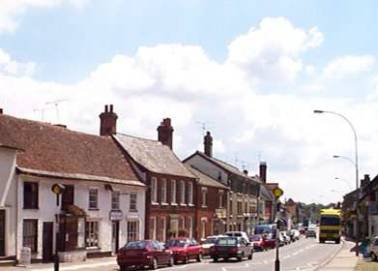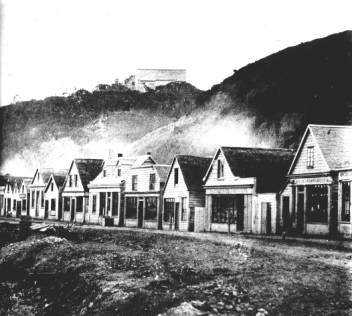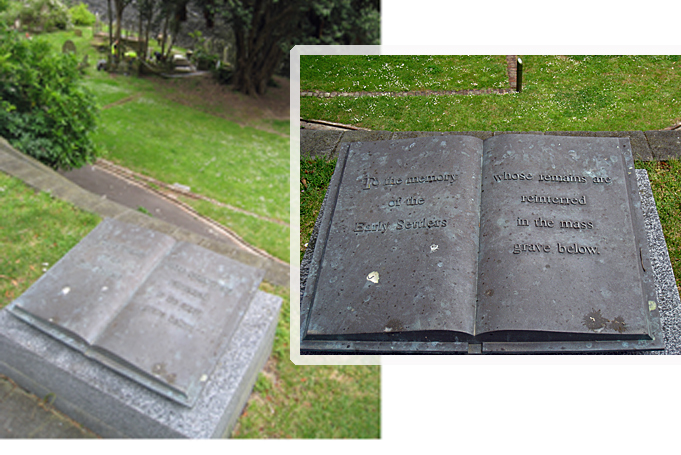 A hotel in Tinakori road, Wellington, around the time William lived in
that street.
A hotel in Tinakori road, Wellington, around the time William lived in
that street. Line of Descent to Peter Byrnes
William Sexton m. Mary Wilson
(Great Grandmother)
This block will be replaced by LeftMenuGaffey (orByrnes) when the page is served from a server.
- Father:
- ??Samuel Sexton
- Mother:
- ??Jane Pilgrim
- Birth:
- Needham, England, c1808-1811
- Occupation:
- Soldier[1]/labourer[2]/storeman[3]
- Death:
- 5 April, 1865, Wellington NZ.
- Cause of Death:
- Epilepsy
- Marriage:
- Mary Wilson 1844 Co. Meath, Ireland[4]
- Children:
- Margaret/Mary SEXTON (845 - 1930)
- William SEXTON (1847 - 1917)
- Sarah SEXTON (1851 - )
- Joseph SEXTON (1853 - )
- James BYRNES [born Sexton] (1857-1932), married Grace Pobar, 1882 Toowoomba
 early
21st century view of the High Street, in Needham Market, Suffolk, where
William was born nearly 200 years earlier. Local historians believe that
it is likely that an unnamed hamlet existed on the town site at the time
of the Domesday Book at the end of the 11th century.[5]
early
21st century view of the High Street, in Needham Market, Suffolk, where
William was born nearly 200 years earlier. Local historians believe that
it is likely that an unnamed hamlet existed on the town site at the time
of the Domesday Book at the end of the 11th century.[5]His regiment, the 65th of Foot (infantry), served in Ireland, West Indies and North America, before being sent to Hobart in 1845 on convict escort duty, and subsequently on to New Zealand.
His unit was assigned to the convict ship Pestonjee Bomanjee, which left Gravesend on September 1, 1845, headed for Van Dieman’s Land with a complement of 298 male convicts guarded by 50 soldiers. Accompanying the soldiers were six women and six children, among them William’s wife Mary (née Wilson) and the couple’s first child, Margaret Mary, who was born just before the ship set sail for the southern colonies..[6] Also in the unit was Francis Burns, another soldier, destined to become Mary’s second partner.
Life in the Army was not easy - William's overseas service left him suffering from intermittent fevers, dysentry and chronic rheumatism. The Medical Officer recommended his discharge (at age 40) because ‘He seems worn out from length of service and is unable to carry his Knapsack’
In all, he chalked up 22½ years of pensionable service - losing the very first year because he was under age when he enlisted, and a spell in 1829 when he deserted, was court martialled and imprisoned for a couple of months. The Army gave him a good testimonial overall - despite a second Court martial for being absent without leave. That time they didn't jail him, just demoted him back to Private. William was discharged on July 31, 1849 and subsequently given an Army pension in February 1850.
At his discharge William was described as being ‘40 yrs 7 months, 5ft 7ins tall, with fair hair, hazle (sic) eyes and a fresh complexion’. He said that he 'intends to reside in the District of Wellington, New Zealand'.
Throughout the 1850s, William worked as a labourer in Wellington, and by 1857, was living in the same street (Tinakori Road) as Francis Burns.[7]

Sometime between the birth of James in 1857, and 1864, his wife Mary left him for Francis Burns. Mary, by then known as Mary Burns, died in Queensland in February, 1864. It appears likely all the Sexton children as well as Mary's youngest, James, accompanied their mother to Queensland.
William died in Wellington on 5 April, 1865 of epilepsy, and was buried the next day with a service at St Paul's Church, Thorndon. The burial register of St Paul's describes William as "late of the 65th Regiment" .[8]

[1] Military information from British War Office records (W.O.97/788 and WO120 Vol.69 p 253), and Discharged in New Zealand (Officers of the Imperial Foot Regiments who took their discharge in New Zealand 1840-1970), by Hugh and Lyn Hughes, NZ Society of Genealogists, 1988 p95 British War Office records, W.O.97/788 WO120 Vol.69 p 253).
[2] UK 1881 Census
[3] as above
[4] PRo of Ireland, Marriage Bonds for the Diocese of Meath, 1844; Notes from Surgeon’s Report on Pestonjee Bomangee ( Tasmanian Archives, Admin 101/59 reel 3206) refers to Mary as the wife of Pte Sexton; and Qld death certificate of Mary’s son James Byrnes, 1932Surgeon’s report of Pestonjee Bomanjee Ref: Admin 101/59 Reel 3206, (This report described Mary Sexton, aged 25, as the wife of Pte. Sexton)
[5] http://www.needham-market.suffolk.gov.uk/
[6] The birth of the baby Mary Sexton was registered by the vessel's master in January 1846, after the ship arrived in Hobart. Her birth had earlier been noted in the1845 Baptism register of the Parish of Woolwich. (Thanks to family history researcher, Margaret Pope, who drew this entry to my attention)
[7] details from the birth certificates of his son James (1857).
[8] NZ death certificate, and Burial register, 1840-1866, of St Paul's Church, Molesworth Street, Thorndon (NB - with thanks to Sexton researcher Lynne Callaghan for this information)